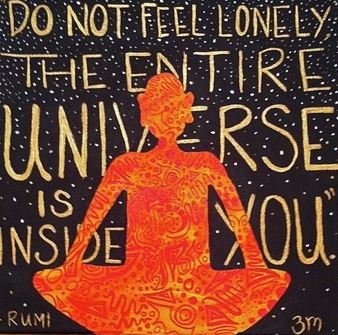Rumi and Rahman Baba give a nuanced view of the Islamic Faith
‘Islam’ is a hot button word in the West right now. A mere mention of the world’s fastest growing faith is likely to prompt mudslinging about everything from the foreign policy of the United States to women’s rights. In a time when, for so many, this rich and diverse religious tradition is associated with violence, close-mindedness and barbarity, the Islamic poetic tradition is a wonderful window into the history of Islamic thought. Islam is closely associated with poetry and the literary arts, with the Holy Qur’an being regularly being praised for the immensely poetic quality of its Arabic. The Islamic and Arab traditions have produced many of recent history’s finest and most distinguished literary stars and intellectuals but today I will limit discussion to Persian poet Rumi and Afghan poet Rahman Baba and how their lyrical poems of love and longing present to us an alternative view of Islam than that given to us by the nightly news.
Rumi

Iran stands today as one of the paragons of “evil fundamental Islam”. Since the formation of the Islamic Republic in 1979 when Iran became a theocratic state ruled by religious authorities the country has been consistently demonised as a backward, anti-Western tyranny by NATO and the United States. [pullquote]Rumi’s verses hum with the energy of transcendent love, his words becoming an inky reflection of his views on the nature of God. [/pullquote]However the old Persian civilisation of the area could be regarded as among the most open, tolerant and progressive societies of the era and it was in 1200s that Persia produced the best-selling Muslim poet of all time: Jalal ad-Din Muhammad Rumi (or just Rumi to his friends and those who think the former is a mouthful).
Rumi was part of the Sufi sect, a group of Islamic mystics who eschewed rigid dogma and strict religious laws in favour of a personal and mystical connection with God, who they saw as a oneness of love that the individual might dissolve themselves into. Much of Rumi’s gorgeous verses reflect this mystic philosophy. Rumi’s verses hum with the energy of transcendent love, his words becoming an inky reflection of his views on the nature of God. In Rumi’s poetry love is the ultimate value, with Rumi saying
In the sight of Love, fear isn’t even as great as a single hair: /in the law of Love, everything is offered as a sacrifice.
Most fascinating of all for our modern view of Islamic dogma is the fact that much of Rumi’s poems celebrating romantic love as divine were said to be inspired by his same-sex love of fellow Sufi mystic Shams of Tabriz. While the degree to which their relationship was a sexual one is debated, the very fact that Rumi’s poetry of intense love was in some way inspired by his love for another man adds nuance to our modern perspective on the Islamic cultural tradition. Rumi is one of the best-selling poets worldwide and his verses adorn Iranian city walls all across the country
Rahman Baba

Afghanistan is probably one of the most evocative words in the modern Western consciousness. The word draws up vicious visions of barren deserts, Eastern espionage, caverns filled with violent fundamentalists and deadly drones hovering low like vultures. Today there sits a shrine, near the Khyber Pass in Afghanistan, to an 18th century mystic and poet known as the ‘Nightingale of Peshawar’.
The man named Rahman Baba is the most celebrated poet ever to have written in the Pashto language and his shrine has, for centuries been a place of pilgrimage for poets and artists to celebrate the philosophy of peace and unity which he expressed in verse. Rahman Baba encouraged his followers to withdraw from the world and, through fasting and prayer, ascend to contact with God through the path of beauty, serenity and the heart. Baba celebrated music, dance and poetry as paths to God through ecstatic joy. The Afghan ‘Nightingale’s’ peaceable demeanour is expressed in his line
We are all one body, /Whoever tortures another, wounds himself.
Today Baba’s shrine , long a host of music, poetry and peaceful, mystical worship, is increasingly under threat from Saudi-funded extremists. These fundamentalists view the pacifistic poetry of Rahman Baba as “anti-Islamic” and thus the legacy of one of Afghanistan’s most inspiring poets and mystics is under threat from the very extremism that clouds our view of such enlightening Islamic history.

